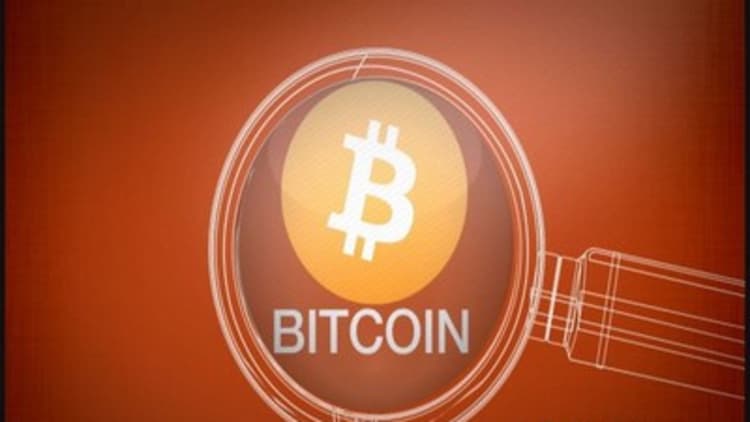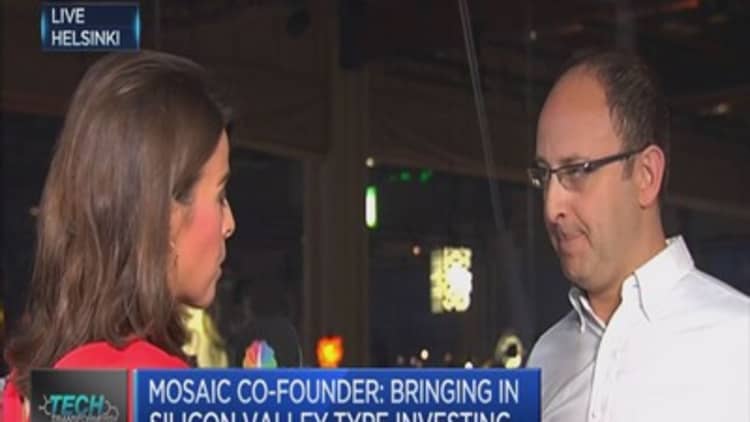


Bitcoin, the revolutionary technological innovation, is becoming old hat.
Even while investors and regulators are paying much more attention (and more money) to the technological architecture underpinning the cryptocurrency, a funny thing is happening: Bitcoin, the very reason for that architecture, is often going completely unmentioned.
That's not to say that bitcoin is becoming less popular as a means of exchange or a store of value — it's price in U.S. dollars is hovering near a one-year high — but people are increasingly showing much more interest in other potential applications of secure distributed ledgers (also called blockchains), which have nothing to do with money.
It's that innovation — the blockchain — that allows for the bitcoin network's global functioning. It securely records information publicly, and concurrently hosts those records on separate computers. And while many have argued that a blockchain is fundamentally insecure without bitcoin's diverse network participants incentivized by monetary reward, not everyone agrees.
"For currency and as a financial rail, bitcoin is the only game in town," said Barry Silbert, founder and CEO of Digital Currency Group, which oversees 68 companies in the virtual currency and associated technologies space. "But as a ledger, I think that most of the efforts underway by the banks are using permissioned or federated blockchain solutions."
In other words, as financial institutions grow to appreciate the efficiencies they can achieve through the technology — cutting out the middlemen of data transfer while keeping information secure — they're opting to keep everything in house.
This trend, Silbert said, is because the firms want to make sure their systems will be scalable, easily audited and definitely around in 30 years. (Bitcoin's future remains in flux, especially as some of its biggest developers battle over the details of its protocol.)
The blockchain-sans-bitcoin discussion was exemplified on Tuesday when Commodity Futures Trading Commission Commissioner J. Christopher Giancarlo spoke at length about the potential of DLT (digital ledger technology) before the Depository Trust & Clearing Corp.'s Blockchain Symposium. Despite singing the praises of blockchains, he neglected to mention bitcoin once in his official transcript.
"It will have profound implications for global financial markets by increasing settlement efficiency and speed, linking recordkeeping networks, reducing transaction costs and increasing market access," Giancarlo said, according to a transcript of his remarks. "It will broadly impact financial markets in payments, banking, securities settlement, title recording, cyber security and trade reporting and analysis."
The shift in focus to non-bitcoin DLT's can also be seen in the massive increase in the price of "ether" — a digital token, not the organic compounds. This token, which serves as a sort of "fuel" for the blockchain-based application platform Ethereum, broke above $14 earlier this month after beginning the year under $1.
Ethereum, the development of which CNBC reported on in 2014, is a decentralized platform running on its own blockchain (not bitcoin's) that allows for developers to create blockchain-based applications. The Ethereum Foundation emphasizes on its website that ether is not meant to be competition to bitcoin, nor is it "intended to be used as or considered a currency, asset, share or anything else," but that desire has apparently been ignored. The dramatic price increase shows that some are speculating on ether, and a recent New York Times report called Ethereum a "rival virtual currency" to bitcoin.
"I'm excited about Ethereum, I'm excited about the community," Silbert said, but he acknowledged that he is concerned about the dramatic price increase. "Quite a bit of speculative trading is going on in ether without there yet being a way to calculate the fundamental intrinsic value of it."
If those buying ether believe it will be used as fuel to pay for new applications' computing costs, it's unclear how much will be needed in this early stage of the ecosystem's development, Silbert said, so valuation is impossible. On the other hand, he added, the use-case for ether as a better means of exchange than bitcoin does not yet exist, and there's been no decision on the final system of supply (unlike the bitcoin protocol), so it's risky as a speculation.
Still, those buying up ether are not the first to see potential in the Ethereum platform.
One source with knowledge of Ethereum's beginnings told CNBC in 2014 that some investment offers valued the project at about $500 million, and that Google Ventures was one of the interested parties. "That's a big number, isn't it? That's an impressive number?" Ethereum's then-chief communications officer Stephan Tual said about the figure, adding that "I don't think the concept would work if we had accepted money."
IBM, Microsoft, JPMorgan, Barclays, UBS and others have been tied to projects using all or part of Ethereum's technology.




